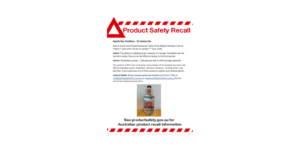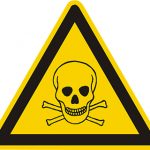The Law, Penalties and Defences for Contaminating Goods in Australia

An Australian distillery has issued an urgent product recall after at least nine of their gin bottles were found to be filled with hand sanitiser.
Apollo Bay Distillery, located on the Great Ocean Road in Victoria, is yet to explain how their bottles of ‘SS Casino Gin’ came to be filled with hand sanitiser rather than the intended juniper-based beverage; although the company has reportedly been producing hand sanitiser during COVID-19 and it may be a labelling issue.
One customer commented on the distillery’s Facebook page:
“Had one glass of this at lunchtime and had a really bad headache and felt nauseas [sic] about 1 hour after and had to take nausea tablets and nurofen”
“Thought I was getting unwell I had no idea until now! If it doesn’t taste right don’t drink it!!! Be careful!”.
The distillery has responded by assuring the public that the hand sanitiser is “not toxic”.
“Should you have purchased a bottle of SS Casino Gin between Friday 5 June to Sunday 7 June please return it to where you purchased it from for a full refund or replacement”, the company posted.
There is no evidence the bottles were intentionally contaminated.
Criminal laws against contaminating goods
Both state and commonwealth laws contain criminal offences relating to the contamination of goods.
Commonwealth laws
Section 380.2(1) of the Criminal Code Act 1995 (Cth) prescribes a maximum penalty of 15 years’ imprisonment for any person who contaminates goods with intent to cause:
- public alarm or anxiety in Australia; or
- widespread, or nationally significant, economic loss in Australia through public awareness of the contamination, or possible contamination, of the goods; or
- harm to, or create a risk of harm to, public health in Australia.
The newly inserted section 380.2(1A) prescribes a 10 year maximum penalty for the same offence where a person is reckless as to the consequences of their actions.
Section 380.2(2) imposes a 15 year maximum penalty for anyone who causes loss to a constitutional corporation, or to constitutional trade or commerce, by contaminating goods with intent to cause:
- public alarm or anxiety; or
- economic loss through public awareness of the contamination, or possible contamination, of the goods.
The newly inserted section 380.2(2A) prescribes a 10 year maximum penalty for the same offence where a person is reckless as to the consequences of their actions.
Sections 380.3 and 380.4 respectively prescribe a 15 year maximum penalty for intentional threats to contaminate goods and intentionally making false statements about contaminating goods.
Sections 380.3(1A) and 380.4(1A) prescribe 10 year maximum penalties for the reckless versions of the offences.
New South Wales laws
Part 3A, Division 3 of the Crimes Act 1900 (NSW) deals with contaminating goods in our state.
The Part begins with section 93J which defines ‘contaminate’ and ‘goods’.
Contaminate is defined to include interfering with goods, or making it appear that goods have been contaminated or interfered with.
Interfere is defined by section 154E of the Act as alter, deface, remove, obliterate, conceal or add.
Goods are broadly defined as any substance or article:
- whether or not for human consumption, and
- whether natural or manufactured, and
- whether or not incorporated or mixed with other goods.
Section 93K states that any person who contaminates goods with the intention of causing public alarm or anxiety economic loss through public awareness of the contamination is liable to 10 years’ imprisonment.
Section 93L and 93M respectively prescribe the same maximum penalty for anyone who threatens to contaminate goods or makes false statements regarding the contamination of goods with intent to cause public alarm or economic loss.
Section 93N increases the maximum to 14 years where a person makes an unwarranted demand – such as a demand for money or to cease stocking the goods – in connection with one of the above offences.
And section 93O imposes a 25 year maximum for a person who commits an offence under section 93K or 93L where death or grievous bodily harm is caused or intended to be caused.
Proof must be beyond reasonable doubt
For each of the above offences, the prosecution must establish proof of the essential elements (or ingredients) beyond a reasonable doubt before a person can be found guilty.
For example, for the offence of contaminating goods with intent under section 93K of the NSW Crimes Act, the prosecution must establish beyond reasonable doubt that the defendant:
- Contaminated goods, and
- By doing so, intended to cause public alarm or anxiety, or to cause economic loss through public awareness of the contamination.
A person is entitled to a finding of not guilty if these elements are not established to the required standard.
Legal defences
In addition to the requirement of proof, the prosecution must disprove beyond reasonable doubt any legal defences that are validly raised in court.
These defences include:
- Duress,
- Necessity, and
- Self-defence, which includes the defence of others.
Again, a person is entitled to an acquittal if the prosecution is unable to disprove any validly raised legal defence.
Going to court for a criminal offence?
If you have been accused of a criminal offence and are going to court, call Sydney Criminal Lawyers anytime on (02) 9261 8881 to arrange a free first consultation with an experienced defence lawyer who will advise you of your options and the best way forward.
Receive all of our articles weekly
Related Articles
RELATED LEGISLATION
- Section 380.2 Criminal Code Act 1995 | Contaminating Goods
- Section 380.3 Criminal Code Act 1995 | Threatening to Contaminate Goods
- Section 380.4 Criminal Code Act 1995 | Making False Statements about Contamination of Goods
- Section 93J Crimes Act 1900 | Definitions of "Contaminate" and "Goods"
- Section 93K Crimes Act 1900 | Contaminating Goods
- Section 93L Crimes Act 1900 | Threatening to Contaminate Goods
- Section 93M Crimes Act 1900 | Making False Statements Concerning Contamination
- Section 93N Crimes Act 1900 | Making Unwarranted Demands In Connection With Contaminating Goods
- Section 93O Crimes Act 1900 | Aggravated Circumstances - Contamination that Causes Death or Grievous Bodily Harm






